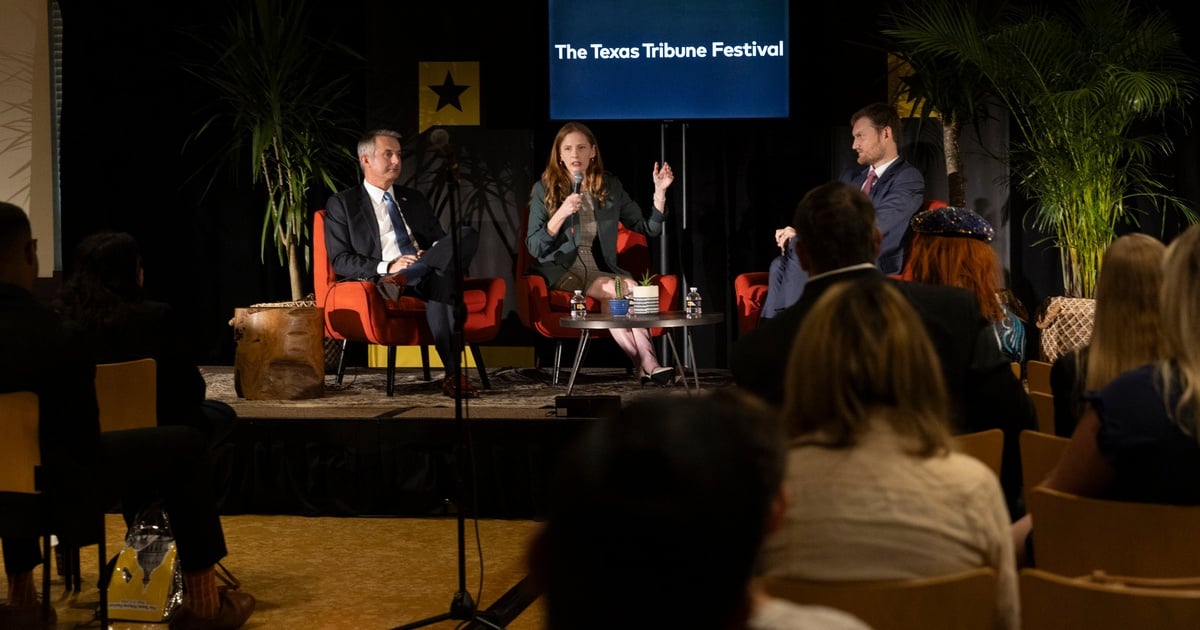Sign up for The Brief, The Texas Tribune’s daily newsletter that keeps readers up to speed on the most essential Texas news.
Challengers to Texas House Speaker Dade Phelan presented a united front on Friday, arguing the speaker race is about reforming the House following bruising battles with the state’s top Republicans and the conservative grassroots.
Reps. Tom Oliverson and Shelby Slawson, both members of House Republican leadership, became the first two candidates to challenge Phelan’s speakership this election cycle, during which 15 Republicans lost their primaries. Those primary results were the conclusion of conservative backlash to the House resisting Gov. Greg Abbott on school vouchers and impeaching Attorney General Ken Paxton, and their respective campaigns to reorder the makeup and priorities of the House Republican caucus.
“It’s time for change in the Texas House and not little change,” Oliverson said during a panel at the Texas Tribune Festival. “It’s time for big change.”
Oliverson, a four-term representative from Cypress who chairs the Texas House Republican Caucus, launched his candidacy in March after nine Republicans lost their primaries and eight, including Phelan, were forced into runoffs. Slawson, a two-term representative from Stephenville, the caucus treasurer, announced her candidacy in March after six more lost their primary runoffs. Rep. David Cook, a two-term Republican from Mansfield, entered the race on Tuesday but declined to participate on the panel.
Despite running competing campaigns to usurp Phelan’s gavel, both declined to present themselves as the best choice for speaker.
“The big goal here is not Shelby, Tom, David or whomever else,” Slawson said. “It’s changing a culture in the House and becoming a more efficient, effective administrator of that chamber.”
It was Oliverson’s idea for the two members to share the stage instead of splitting back-to-back one-on-one interviews.
“There’s not a lot of daylight between Tom Oliverson and Shelby Slawson,” Slawson said.
Two days before the end of the 2023 regular session, the House voted overwhelmingly to impeach Paxton after an investigation that wasn’t revealed until just that week. This whiplash-inducing saga left members questioning the process, particularly after the Senate acquitted Paxton and he launched his retribution campaign.
Oliverson was vice chair of the caucus at the time and served on the caucus executive committee with Slawson. He said Friday that, before the impeachment vote, he and others on the caucus executive committee requested a caucus meeting to discuss the game plan for the impeachment trial and the allegations but were denied.
Slawson was one of 23 Republicans to vote against impeachment.
“It’s kind of a heavy handed expectation that there are certain votes that you will take, because leadership believes that that’s the right thing, even if it’s not the right thing according to my voters or your voters or someone else’s back home, and that’s problematic for everybody in this room,” Slawson said.
One of the biggest process changes Oliverson and Slawson want to make is to stop appointing Democrats as committee chairs. Oliverson said the Texas House is on the “tail-end of history” on bipartisan leadership teams and detailed two instances in which his bills have died at the hands of a Democratic chair.
Forty-six incumbent Republicans and Republican nominees for the House have signed a pledge saying they would not support a speaker candidate who appoints Democrats as committee chairs, enough to deny Phelan the caucus’ endorsement as speaker potentially. Both Oliverson and Slawson said they would support the caucus process, which would have them support whoever wins an in-caucus process.
Also at the Tribune festival, some of Phelan’s loudest critics continued to attack him for allowing Democrats to chair a handful of House committees and framing him as a symptom of political horse-trading. And they vowed harsh political retribution for any Republican who helps elect Phelan speaker by joining the coalition of Democrats he’d need to cross the vote threshold.
“We already have the names,” said Mitch Little, who is all but certain to win his race in House District 65 after ousting a freshman incumbent in the primary. “There is no way (Phelan) can obtain a majority of the votes in the Republican caucus. Period. End of sentence. It cannot happen mathematically. His only path is to go through the Democrats and a certain number of Republicans who want to be primaried in 2026 to a level you’ve never seen before in this state.”
Lt. Gov. Dan Patrick, who has scrapped with speakers throughout his nearly 10 years leading the Senate, escalated his feud with House leadership this cycle when he supported Phelan’s opponent during those primaries and has called on the House to elect a different speaker.
“Right now, you have a relationship between the leaders of the two chambers which is completely irreconcilable. It cannot be fixed. It is mutually assured destruction,” Oliverson said. “It has been the case in the past, and it can be the case again, that we move from mutually assured destruction to mutual respect and cooperation, but it’s going to take a change in leadership to get there.”
Robert Downen contributed.
As The Texas Tribune’s signature event of the year, The Texas Tribune Festival brings Texans closer to politics, policy and the day’s news from Texas and beyond. Browse on-demand recordings and catch up on the biggest headlines from Festival events at the Tribune’s Festival news page.

